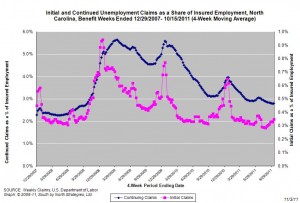03.11.2011
Policy Points
Economic policy reports, blog postings, and media stories of interest:
03.11.2011
Policy Points
For the benefit week ending on October 15, 2011, some 13,206 North Carolinians filed initial claims for state unemployment insurance benefits, and 106,403 individuals applied for state-funded continuing benefits. Compared to the prior week, there were more initial and continuing claims. These figures come from data released by the U.S. Department of Labor.
Averaging new and continuing claims over a four-week period — a process that helps adjust for seasonal fluctuations and better illustrates trends — shows that an average of 12,985 initial claims were filed over the previous four weeks, along with an average of 104,522 continuing claims. Compared to the previous four-week period, the average numbers of initial and continuing claims were higher.
One year ago, the four-week average for initial claims stood at 14,075 and the four-week average of continuing claims equaled 116,457.
While the number of claims has dropped over the past year so has covered employment. Last week, covered employment totaled 3.72 million, down from 3.74 million a year ago.
 The graph shows the changes in unemployment insurance claims (as a share of covered employment) in North Carolina since the recession’s start in December 2007.
The graph shows the changes in unemployment insurance claims (as a share of covered employment) in North Carolina since the recession’s start in December 2007.
Both new and continuing claims appear to have peaked for this cycle, and the four-week averages of new and continuing claims have fallen considerably. Yet continuing claims remain at an elevated level, which suggests that unemployed individuals are finding it difficult to find new positions.
03.11.2011
Policy Points
Writing in The Nation, Ari Berman explains “how the austerity class rules Washington.”
The austerity class testifies frequently before Congress, is quoted constantly in the media by sympathetic journalists and influences policy-makers and elites at the highest levels of power. They manufacture a center-right consensus by determining the parameters of acceptable debate and policy priorities, deciding who is and is not considered a respectable voice on fiscal matters. The “balanced” solutions they advocate are often wildly out of step with public opinion and reputable economic policy, yet their influence endures, thanks to an abundance of money, the ear of the media, the anti-Keynesian bias of supply-side economics and a political system consistently skewed to favor Wall Street over Main Street.
…
Taken together, the various strands of the austerity class form a reinforcing web that is difficult to break. Its think tanks and wonks produce a relentless stream of disturbing statistics warning of skyrocketing debt and looming bankruptcy, which in turn is trumpeted by politicians and the press and internalized by the public. Thus forms what Washington Post blogger Greg Sargent calls a Beltway Deficit Feedback Loop, wherein the hypothetical possibility of a US debt crisis somewhere in the future takes precedence over the very real jobs crisis now.
02.11.2011
Policy Points
Economic policy reports, blog postings, and media stories of interest:
02.11.2011
Policy Points
Free Exchange reports on one possible future source of middle-income jobs…
IT’S been one of the hottest economic questions for at least the last few decades: what sort of jobs will provide a comfortable, secure, middle-class lifestyle for the next generation of Americans? America still has a vibrant manufacturing industry, but it no longer offers large numbers of desirable jobs. During a panel at last week’s Buttonwood conference Harvard economist Larry Katz had an answer. He reckons that future “good” middle-class jobs will come from the re-emergence of artisans, or highly skilled people in each field. Two examples he mentioned: a contractor who installs beautiful kitchens and a thoughtful, engaging caregiver to the elderly. He reckons the critical thinking skills derived from a liberal arts education give people who do these jobs an edge. The labour market will reward this; the contractor who studied art history or the delightful caregiver with a background in theatre will thrive.


 Email Sign-Up
Email Sign-Up RSS Feed
RSS Feed